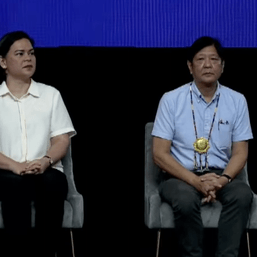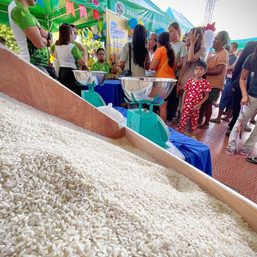SUMMARY
This is AI generated summarization, which may have errors. For context, always refer to the full article.

MANILA, Philippines – The Philippine government has lowered the tariffs on imported rice from 35% to 15%.
The change in policy is contained in Executive Order 62 by President Ferdinand Marcos Jr., signed by Executive Secretary Lucas Bersamin and released publicly on Thursday, June 20.
That document modifies the nomenclature and rates of import duty on various products, including Filipinos’ staple food.
National Economic and Development Authority (NEDA) Secretary Arsenio Balisacan first disclosed about this plan in early June, saying the move “aims to lower the price of rice further and make it more affordable.”
“Reducing rice tariffs is expected to bring down rice prices for consumers while supporting domestic production through tariff cover and increased budgetary support to improve agricultural productivity, especially as global rice prices remain elevated,” the socioeconomic planning chief said on June 4.
Farmer groups, however, have rejected the proposal, asserting that throughout history, reduced price tariffs have led to more rice imports, and increased rice prices, while penalizing local producers and depriving government of revenues.
The government’s revenues from rice tariffication are intended to serve as seed money for the Rice Fund – which has an annual budget of P10 billion – under Republic Act 11203 or the Rice Tariffication Law (RTL).
The House has also approved a bill that seeks to increase the annual budget of the Rice Fund from P10 billion to P15 billion, although the Senate has yet to separately discuss the proposed amendments to the RTL.
Agriculture Secretary Francisco Tiu Laurel has said his agency stands ready to fill any potential shortfall in the fund, which are released to rice-producing areas to finance farmers’ equipment, extend credit assistance to them, and help in rice seed development, among others. – Rappler.com
Add a comment
How does this make you feel?

![[In This Economy] Why amending the Rice Tariffication Law will reopen Pandora’s box](https://www.rappler.com/tachyon/2024/05/amending-rice-tarrification-may-17-2024.jpg?fit=449%2C449)

![[In This Economy] Runaway rice prices are making inflation higher than it needs to be](https://www.rappler.com/tachyon/2024/02/tl-rice-prices.jpg?resize=257%2C257&crop=560px%2C0px%2C720px%2C720px)
![[ANALYSIS] A soft and range-bound stock market that has not lost its luster](https://www.rappler.com/tachyon/2024/02/TL-market-soft-range-bound-February-9-2024.jpg?resize=257%2C257&crop_strategy=attention)
![[In This Economy] Looks like PH economy will never get back on track. Here’s the data.](https://www.rappler.com/tachyon/2024/02/20240202-PH-economy-back-on-track.jpg?resize=257%2C257&crop=289px%2C0px%2C720px%2C720px)




![[WATCH] The new Negros Island Region: What’s it about?](https://www.rappler.com/tachyon/2024/06/new-negros-island-region-ls.jpg?resize=257%2C257&crop=421px%2C0px%2C1080px%2C1080px)
![[ANALYSIS] How one company boosts farmer productivity inside the farm gate](https://www.rappler.com/tachyon/2024/06/bioprime-farmgate-farmer-productivity-boost.jpg?resize=257%2C257&crop=465px%2C0px%2C1080px%2C1080px)


![[ANALYSIS] The department of ambivalent, if not ambiguous agriculture](https://www.rappler.com/tachyon/2024/05/department-of-ambivalent-05252024.jpg?resize=257%2C257&crop=279px%2C0px%2C720px%2C720px)
There are no comments yet. Add your comment to start the conversation.